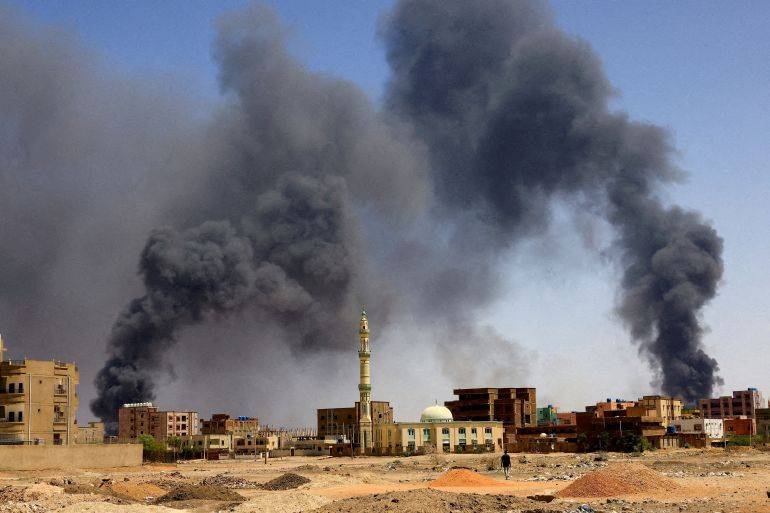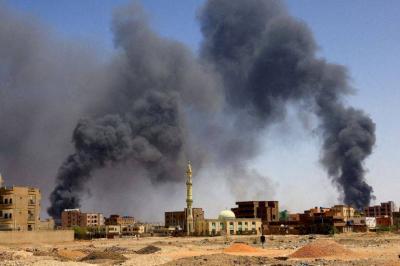Residents reported that the warring factions in Sudan engaged in intense clashes in parts of Bahri city today, Friday, following a day when both sides welcomed new mediation efforts aimed at ending the ongoing war that has lasted for three months. Residents in northern Bahri woke up to the sound of fierce fighting between the two sides, with the clashes centered around the Halfaya Bridge. While the Rapid Support Forces focused on quickly spreading throughout the capital on the first day of fighting, the army concentrated on aerial and artillery strikes, which contributed little to changing the situation. The army has carried out more ground operations in recent weeks, specifically in Omdurman.
Bahri residents reported hearing the sounds of airstrikes, artillery shells, and gunfire that continued into the afternoon. A military source stated that the army succeeded in driving the Rapid Support Forces out of neighborhoods in the far north of the city, but the Rapid Support Forces claimed in a statement that they were able to defeat army troops and kill hundreds. Residents in the broader Khartoum area reported a communications blackout for several hours during the morning. Other witnesses reported clashes also around an army base in southern Khartoum.
The Rapid Support Forces announced today, Friday, that they repelled an attack launched by the Sudanese army on their positions in Bahri. For its part, the Sudanese army denied suffering heavy losses in part of the Bahri axis during extensive combing operations, saying, “We had some losses, but they did not affect the course of operations.” The army confirmed in its statement that it conducted ground operations in the three cities of the capital and that these operations were successful.
Politically, Deputy Chairman of the Sovereignty Council Malik Agar stated that his country has no negative positions towards the countries of the African IGAD organization, confirming readiness to cooperate with them. Agar explained, “Our objection was to the Kenyan president's assumption of the presidency of the IGAD quadruple mechanism without approval.” In a related context, Reuters reported from the U.S. State Department that “Washington condemns the continued atrocities of the Rapid Support Forces and their allies in West Darfur.” The U.S. State Department spokesperson welcomed the announcement by the International Criminal Court’s chief prosecutor that war crimes and abuses against civilians may be the subject of investigation and prosecution.
In turn, the U.S. embassy in Khartoum stated, “Reports of mass graves in Misteri and Geneina provide further evidence of the atrocities committed by the Rapid Support Forces.” The U.S. embassy emphasized the necessity to stop the fighting in Sudan and that there should be accountability. The UN Special Envoy to Sudan, Volker Perthes, confirmed that "the country is facing a real disaster and stands on the brink of full civil war."
The Red Cross
The International Committee of the Red Cross issued a statement about the humanitarian conditions in Sudan, noting that “as fighting in Sudan enters its fourth month, people in Khartoum, Darfur, and other areas are living in harsh conditions, barely receiving healthcare, water, and electricity amid a sharp rise in food prices throughout the country. The humanitarian situation is deteriorating seriously, and people need urgent humanitarian assistance in the absence of a political solution.”
Martin Taalman, the ICRC's operations director in Sudan, stated, “Civilians and essential infrastructure should not be targeted and must be protected at all times. All parties must provide guarantees for relief workers to access affected areas to deliver humanitarian assistance. This is crucial for delivering life-saving supplies to hospitals, providing clean water, and restoring electricity networks.” The statement noted that “escalating fighting in Khartoum, Darfur, and other parts of Sudan has led to thousands of casualties, the displacement of more than two million people from their homes, and the influx of hundreds of thousands of refugees into neighboring countries in search of safety, primarily Egypt, South Sudan, and Chad.”
The ongoing hostilities have also depleted the healthcare system in the country, with approximately 80% of hospitals and healthcare facilities in most conflict-affected areas ceasing to operate. This places a huge burden on existing healthcare structures that must now meet ongoing health needs and provide care to large numbers of injured patients and displaced individuals. The ICRC and the Sudanese Red Crescent continue to cross frontline lines, evacuate the most vulnerable individuals, assist in the transfer of released detainees, and support hospitals in Khartoum and its surrounding areas, Darfur, and other parts of Sudan. In neighboring Chad, the ICRC supports healthcare services for refugees and helps people contact their families.




